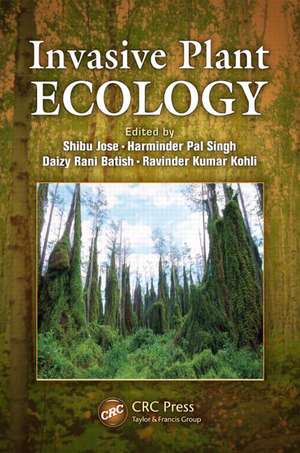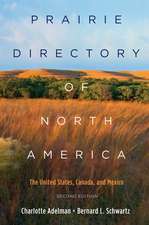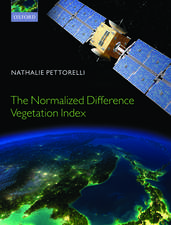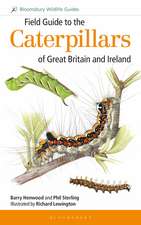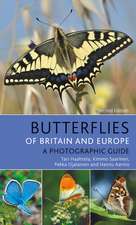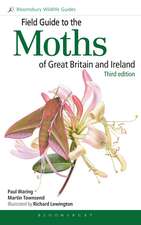Invasive Plant Ecology
Editat de Shibu Jose, Harminder Pal Singh, Daizy Rani Batish, Ravinder Kumar Kohlien Limba Engleză Hardback – 9 ian 2013
Actions essential for coordinated approaches to curtail plant invasion include increasing awareness of the ecological impacts of alien plants and employing novel control strategies. This book provides a foundation in invasion ecology by examining ecological theories and case studies that explain plant invasions, their impacts, management strategies, and the ecological economics. The chapters describe ecological characteristics, mutualistic associations, microbial communities, and disturbance regimes that affect the spread of invasive plants. The book also covers spatial analysis and predictive modeling of invasive plants.
The final chapters offer guidelines for ecological management and restoration of invaded areas and describe the economics of the invasive plant issue. This collection contains case studies from around the world, giving readers a real view of the extent of the invasive species issue along with real-world strategies. With its focus on the ecological aspects of plant invasion, this book provides an important reference for students, scientists, professionals, and policy makers who are involved in the study and management of alien invasive plants and ecosystems.
Preț: 792.71 lei
Preț vechi: 966.71 lei
-18% Nou
151.72€ • 156.36$ • 128.09£
Carte tipărită la comandă
Livrare economică 03-17 martie
Specificații
ISBN-10: 143988126X
Pagini: 302
Ilustrații: 56 b/w images, 8 color images and 34 tables
Dimensiuni: 178 x 254 x 23 mm
Greutate: 0.75 kg
Ediția:1
Editura: CRC Press
Colecția CRC Press
Public țintă
University teachers, researchers, students, scientists, resource professionals, policy makers and planners, resource managers, analysts, practitioners, and the general public.Cuprins
Notă biografică
Shibu Jose, Ph.D., an applied ecologist, is the H.E. Garrett Endowed Professor in the School of Natural Resources and director of the Center for Agroforestry at the University of Missouri. He is the editor-in-chief of Agroforestry Systems and associate editor of the International Journal of Ecology and the Journal of Forestry. Dr. Jose’s research program studies key ecological processes and interactions that define ecological sustainability. He examines how resource availability and disturbances influence ecosystem structure and uses the information in designing agroforestry systems and restoring degraded and damaged ecosystems. Dr. Jose and his research team have conducted studies in the United States, Australia, Costa Rica, Belize, Bangladesh, Panama, and India. He has more than 150 publications, including 6 edited books and 3 special issues.
Harminder Pal Singh, Ph.D., an ecophysiologist, is an assistant professor in the Department of Environmental Studies at Panjab University, Chandigarh, India. His research interests include examining the ecophysiological basis of plant interactions, evaluating the impact of exotic invasive plants on structural and functional aspects of native ecosystems, and exploring the role of natural plant products as novel pesticides. His research findings have resulted in 75 research papers in refereed journals and 6 edited books.
Daizy R. Batish, Ph.D., is a professor in the Department of Botany at Panjab University, Chandigarh, India. Over the past 20 years, Dr. Batish and her research group have been involved in studying the biology and ecology of invasive weeds, ecophysiology of plantߝplant interactions, and ecological weed management. Her research program aims at identifying and evaluating plant products with potential application as novel herbicides under sustainable agriculture. Dr. Batish has published over 100 research papers in refereed journals, 6 books, and 40 research articles.
Ravinder Kumar Kohli, Ph.D., a certified senior ecologist of the Ecological Society of America and JC Bose National Fellow of the Government of India, is the senior-most professor and Dean University Instruction at Panjab University, Chandigarh, India. He is a fellow of all four national official Indian academies of science. He is the coordinator of IUFRO unit 8.02.04-Ecology of Alien Invasives and 4.02.02-Multipurpose Inventories. Dr. Kohli’s research career of 32 years remains focused on the ecological implications of introduced alien trees and invasive alien plants in India. He is on the editorial boards of several journals devoted to crop production, ecology, and the environment and a reviewer of several international journals. He has published approximately 260 research papers, including 12 books.
Recenzii
—R.B. Pratt, CHOICE, August 2013
"This collection contains case studies from around the world, giving readers a real view of the extent of the invasive species issue along with real-world strategies. With its focus on the ecological aspects of plant invasion, this book provides an important reference for students, scientists, professionals, and policy makers who are involved in the study and management of alien invasive plants and ecosystems."
—Southeastern Naturalist, Issue 12/2, 2013
"… an excellent collection of thought-provoking essays by an international group of scientists, researchers, and academicians discussing the challenges of invasive plants from an ecological perspective but with multidisciplinary approaches. The book will be valued for its comprehensive coverage of both basic and applied models involving invasion, establishment, and competition generated by invasive species in vulnerable ecosystems and ecozones. … recommended for students at the undergraduate and postgraduate level, and for researchers and academics in the fields of life sciences, plant sciences, botany, biology, plant ecology, environmental science, agriculture, forestry sciences, applied botany, and applied ecology."
—S. K. Basu, University of Lethbridge, Lethbridge, Alberta, Canada, in PLANT SCIENCE BULLETIN 59(3) 2013
Descriere
Invasion of non-native plant species, which has a significant impact on the earth’s ecosystems, has greatly increased in recent years due to expanding trade and transport among different countries. Understanding the ecological principles underlying the invasive process as well as the characteristics of the invasive plants is crucial for making good management decisions to address this problem. Invasive Plant Ecology includes chapters derived from presentations at conferences such as the World Congress of the International Union of Forestry Research Organizations (IUFRO), as well as contributions from invited renowned authors. The chapters include both original research and syntheses of current knowledge on specific topics.
Actions essential for coordinated approaches to curtail plant invasion include increasing awareness of the ecological impacts of alien plants and employing novel control strategies. This book provides a foundation in invasion ecology by examining ecological theories and case studies that explain plant invasions, their impacts, management strategies, and the ecological economics. The chapters describe ecological characteristics, mutualistic associations, microbial communities, and disturbance regimes that affect the spread of invasive plants. The book also covers spatial analysis and predictive modeling of invasive plants.
The final chapters offer guidelines for ecological management and restoration of invaded areas and describe the economics of the invasive plant issue. This collection contains case studies from around the world, giving readers a real view of the extent of the invasive species issue along with real-world strategies. With its focus on the ecological aspects of plant invasion, this book provides an important reference for students, scientists, professionals, and policy makers who are involved in the study and management of alien invasive plants and ecosystems.
